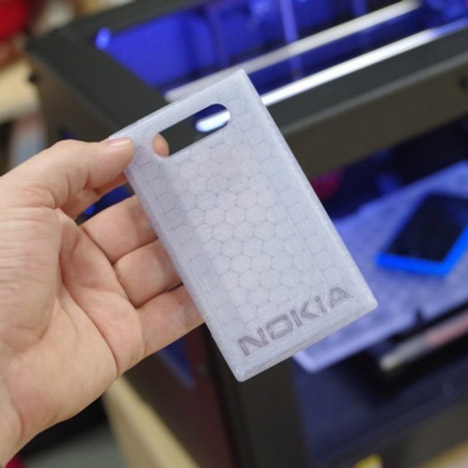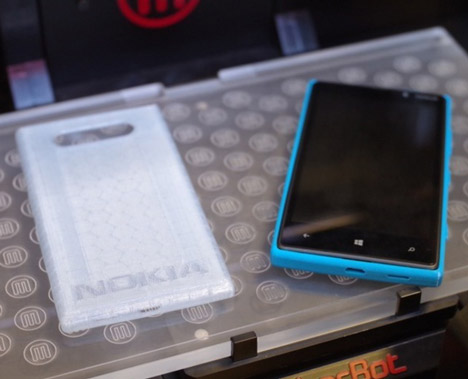
Nokia is "first global company to embrace open design"
News: Nokia has become the first major manufacturer to give consumers access to its 3D design files so they can create their own versions of products, according to open design pioneer Ronen Kadushin.
"I'm pretty sure they are first global company to have a go at open design," said Kadushin, following last week's news that the Finnish mobile phone brand released digital files allowing users to alter and 3D print their own shells for the Lumia 820 smartphone.
Berlin-based designer Ronen Kadushin, who has been making open design templates freely available for download since 2005, says Nokia's move is timely.
"I think they did it because they are in a business situation that pushes them to try this new model – not to make money, but to focus their brand identity as up-to-date and in tune with the 3D printing and maker culture," Kadushin told Dezeen.
However, Kadushin doubts that Nokia will be able to control who downloads and uses their templates. "You have to register as a developer to download the files, but tomorrow it [will be] on The Pirate Bay for anyone to download anonymously," he said. "But in any case, they will create a community of developers that will generate designs, new ideas, solutions and creativity."
According to Wikipedia, open design is "the development of physical products, machines and systems through use of publicly shared design information". Enthusiasts see it as an alternative to the "closed" product development model employed by major brands, that jealously guard their intellectual property.
Electronics company Teenage Engineering began offering replacement parts for its synthesisers as downloadable 3D print files last year, but Nokia is the first major manufacturer to allow users access to its designs.

Last April, Domus editor Joseph Grima talked about the birth of "the era of open design". In an interview with Dezeen, Grima said: "More and more design is resonating with the spirit of the social media era where it's much more about sharing ideas, collaborating, being completely transparent, completely open, rather than the secretive model of the past."
Grima curated an exhibition in Milan last year called The Future in The Making: Open Design Archipelago, which explored how designers were harnessing digital design and manufacturing technologies to share information and manufacture products without having to rely of large-scale industry or major brands.
Dezeen's editor-in-chief Marcus Fairs interviewed Kadushin during Vienna Design Week last year, where he warned that 3D printers could soon enable people to print ammunition for an army.
Kadushin also discussed open in a video filmed at the launch of a book on the subject in Berlin in 2011.
The book, called Open Design Now, claims that design is "undergoing a revolution" thanks to new technologies like 3D printers and accessible software.
"Anyone can be a designer today," the book adds. "Professionals and enthusiastic amateurs alike are using open design – the creation of products using publicly available blueprints and instructions – to share their work with the world. Consumers are designing cars, restaurants, even prosthetic legs."
Kadushin's previous open-source products including a contraceptive device made from a copper coin and a mallet for smashing up iPhones – see all designs by Ronen Kadushin.
See all stories about open design »
See all stories about 3D printing »